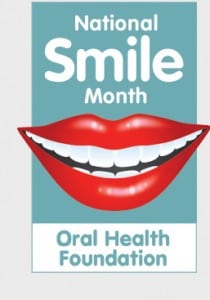National Smile Month what’s in a smile
You have probably seen in the news the issues surrounding oral health at the moment with regards to the effect sugar has on our teeth.
People need to be more aware of the devastating effect sugar can have on their oral health and be conscious to how often they are consuming it. They need to recognise when there are ‘hidden sugars’ in supposedly healthy foods and take measures to prevent against their effects.
One of the most worrying issues is the state of children’s oral health in the UK: nearly a third (31 per cent) of five-year-olds and half (46 per cent) of eight-year-olds have visible signs of dental decay. This can be down to many reasons such as a poor diet or a lack of oral health education and needs to be addressed urgently. We encourage patients to register their children with the practice as soon as possible. It’s often a good idea to bring the little ones with you on a visit so they can get used to the unusual sights, sounds and smells before their first appointment.
We want your smiles to last a lifetime so if you are at all concerned about your or your family’s teeth, please do contact our Coventry dental practice and make an appointment to see one of the friendly dental team.

